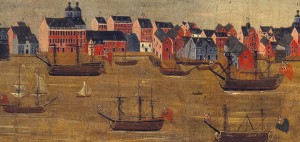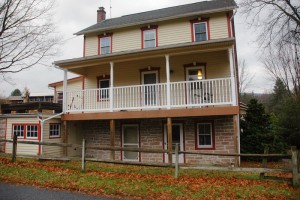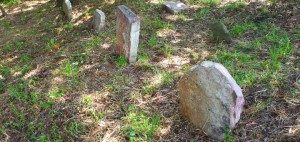Andreas Hagenbuch was born in 1715 near Grossgartach in present-day Germany and died during the summer of 1785 in Albany Township, Pennsylvania. He was the son of Hans Michael Hagenbuch and Anna Christina (Fritz) Hagenbuch. He is known to have had at least one sibling, a younger brother named Phillip Jakob Hagenbuch.
Early Life
Little is known about Andreas’s early life. A baptism for an Andreas Hagenbuch occurred on March 16, 1715 in the Grossgartach Lutheran Church. The record notes Andreas’s date of birth as March 15, 1715.1
Since records exist of his signature, it is assumed that he received an education and was able to read and write German. The family may have had at least some means and knowledge of business, given Andreas’s later success.
Marriages & Children
Andreas was married in the spring of 1737 to Maria Magdalena Schmutz and traveled with her to the Americas. Together they are believed to have had two children: Henry and Catherine. Maria Magdalena is thought to have died sometime between 1740 and 1744.
Around 1744, while living in Pennsylvania, Andreas married his second wife, Maria Margaretha Friedler. They had ten children: Maria, Michael, Christian, Magdalena, Anna Elizabeth, John (who died soon after birth), Anna Margaretha, Christina, John and Anna Barbara. Maria Margaretha outlived Andreas and is mentioned as his widow in his will.
Emigration
Andreas Hagenbuch, along with his first wife, emigrated from his home in Germany during the spring of 1737. The trip took him down the Rhine River to Rotterdam, Netherlands.
In Rotterdam, he and his family boarded the ship, Charming Nancy, which was sailing for Philadelphia, Pennsylvania. The couple paid their own way and were not indentured. The ship left port on June 29, 1737 and stopped in Plymouth, England on July 8th. On July 17, 1737 the Charming Nancy left port and began its long journey across the Atlantic Ocean to America.2
Andreas docked in Philadelphia on September 18, 1737. On October 8th he signed his name to an oath of allegiance to the King of England, of which a record exists. During the next few months, he began the process of looking for an open land grant on which to settle.
Building a Homestead
On March 25, 1738, Andreas Hagenbuch receive a grant for 200 acres of land in what is today Albany Township, Berks County, Pennsylvania. At the time, the area was also known as the Allemangel. Here, he would establish his first homestead.3
By 1741, Andreas abandoned his first tract and relocated nearby to a 150.5 acre land grant.4 Over the next several decades he would add additional land, including 14 acres in 1749 and another 14 in 1766. It is likely that he had additional landholdings as well.
During Andreas’s time, the Hagenbuch homestead profited from many industries such as distilling, agriculture, and textiles.
Dangers & War
While it is not believed that Andreas Hagenbuch directly served in any war, he is known to have participated and supported various war efforts. During the French and Indian War, the Hagenbuch homestead is thought to have been a place of refuge, and it may have been one of the few stone structures in the area.5 Albany Township suffered several attacks by American Indians during the war and the Hagenbuch name is mentioned in newspaper articles chronicling these.6
Andreas is also known to have been in possession of a large amount of Continental money when he died.7 This, along with his sons’ enlistment, indicates his support of the American Revolutionary War.
Later Years
Near the end of his life, Andreas passed the Hagenbuch homestead to his son Michael. When he died around August of 1785, he left a will providing money for his children and his widow. The will included several curious items as well, such as a copy of True Christianity which was specifically given to his youngest son, John.8
Andreas Hagenbuch is buried at the Hagenbuch homestead alongside other members of the family.



